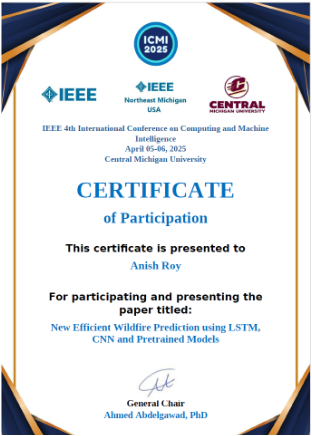Wildfire Prediction
IV. Wildfire Prediction
Motivation
Over the last two decades, global warming has driven a dramatic increase in the frequency and intensity of wildfires, causing significant ecological damage and human impact. Between 2001 and 2019, North America alone experienced a 42–44% decline in forests [1]. Rising aridity, inflammability, and persistent positive anomalies (PPAs) [2] have intensified this crisis, with severe consequences for physical and mental health, particularly among vulnerable populations. These challenges underscore the urgent need for accurate wildfire modeling and prediction. While remote sensing and data-driven methods have supported wildfire management, recent advances in Artificial Intelligence (AI) and Machine Learning (ML) offer new opportunities to significantly enhance predictive accuracy.
[2] A. R. Sharma, P. Jain, J. T. Abatzoglou, and M. D. Flannigan, "Persistent positive anomalies in geopotential heights promote wildfires in western north America," Journal of Climate, 2022
Goal
The goal of this work is to design and evaluate efficient wildfire prediction methodologies using deep learning models. Specifically, we employ Long Short-Term Memory (LSTM) networks for sequence learning, Convolutional Neural Networks (CNN) for spatial feature extraction, and advanced architectures such as Residual Networks (ResNet) and Densely Connected Convolutional Networks (DenseNet) to further improve performance.
Results
We trained and validated our models using publicly available wildfire datasets. Experimental results demonstrate that our proposed models achieve strong performance, with testing accuracies of 76% (LSTM), 91% (CNN), 88% (ResNet), and 95% (DenseNet). These results confirm that deep learning approaches can successfully classify wildfire data, yielding high true positive and true negative rates and enabling more reliable wildfire prediction and preparedness.
Publications
Listed below are our publications based on this research:
- Anish Roy and R. Sonth, "New Efficient Wildfire Prediction using LSTM, CNN and Pretrained Models", IEEE 4th International Conference on Computing and Machine Intelligence (ICMI), April 5-6, 2025, Central Michigan University, USA. DOI: 10.1109/ICMI65310.2025.11141196
Certificate of Participation
